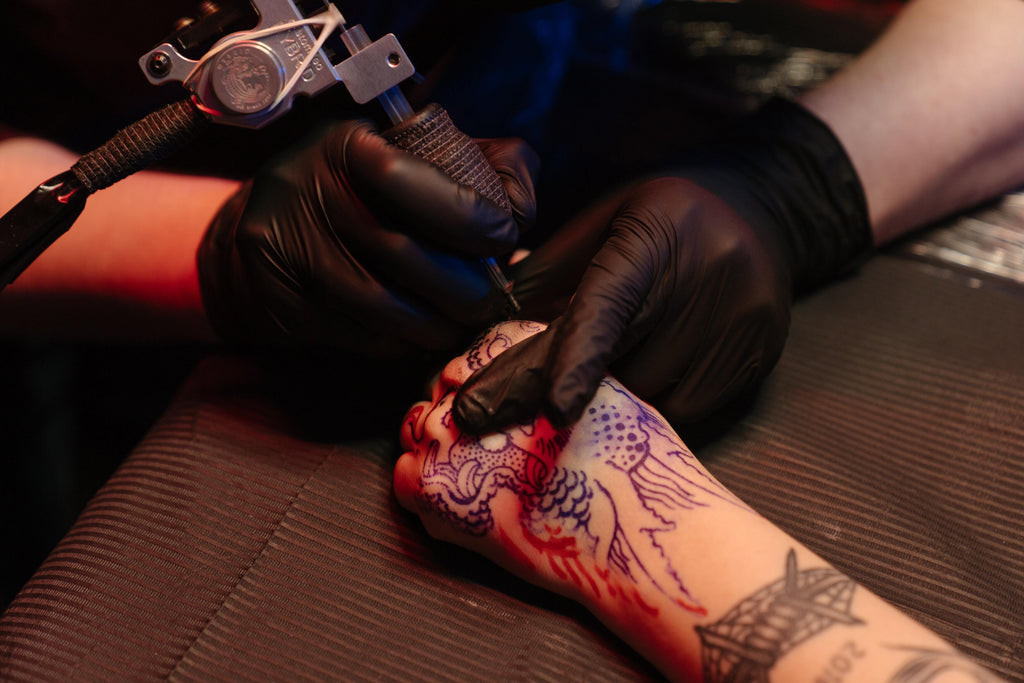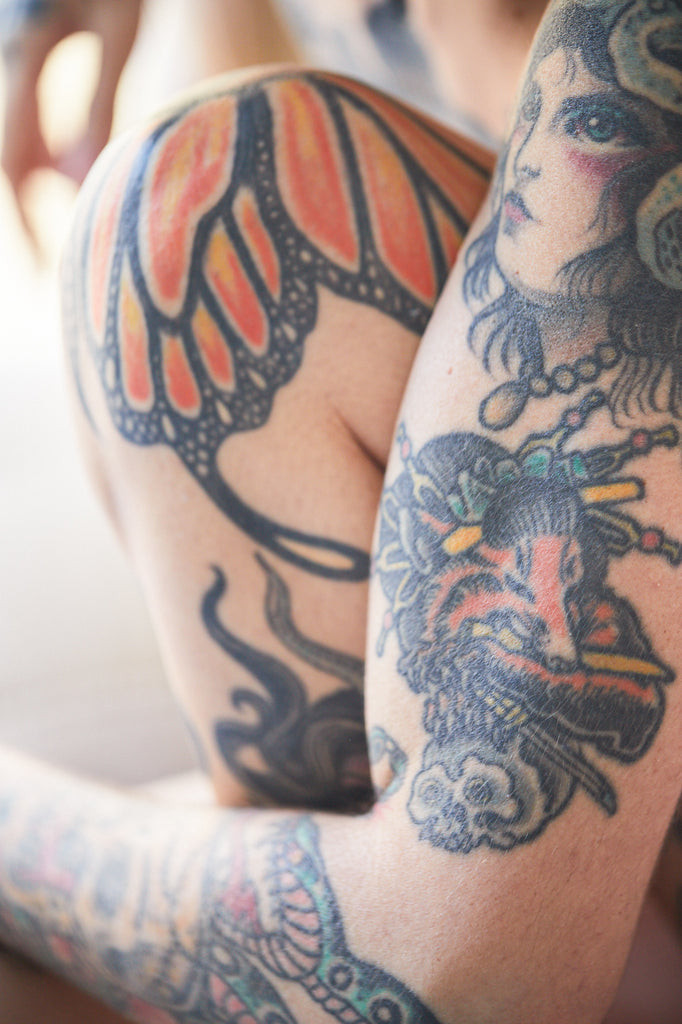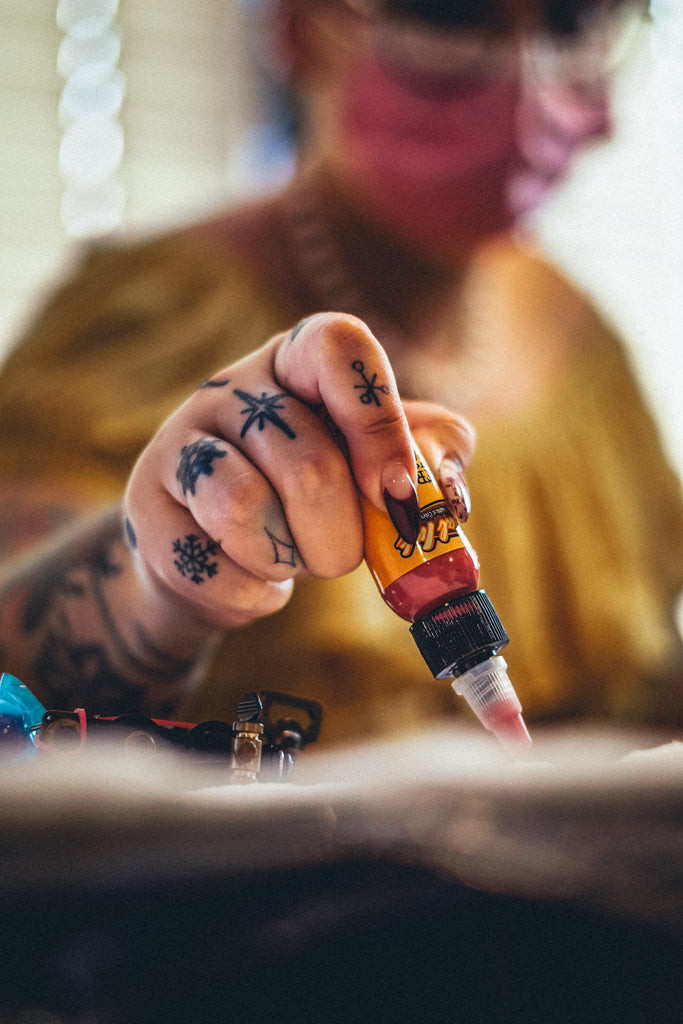Can You Feel A Tattoo On Your Skin? Yes, you can feel a tattoo on your skin, even after it heals, and the sensation can vary. This comprehensive guide, brought to you by tattooat.com, explores the reasons behind this phenomenon, offering insights into tattoo aftercare, potential allergic reactions, and the long-term effects of tattooing, ensuring your tattoo experience is both informed and enjoyable. Dive in to understand the art and science behind your body art.
1. Why Can You Still Feel Your Tattoo After It Heals?
Yes, you can typically still feel a tattoo on your skin after it heals because the tattooing process involves depositing ink into the dermis layer of the skin, which contains nerve endings. Even though the surface layer of the skin heals, the ink remains in the dermis, which can create a subtle but noticeable sensation.
- Nerve Stimulation: Tattoos involve injecting ink into the dermis, which is rich in nerve endings. Even after healing, these nerves can remain slightly stimulated, leading to a persistent sensation.
- Scar Tissue Formation: Minor scar tissue can form during the healing process, especially with larger or more intricate designs. This scar tissue can contribute to the feeling of the tattoo on your skin.
- Ink Density: The amount and density of ink used can also affect how much you feel the tattoo. Areas with more ink might feel more pronounced.
- Location on the Body: The location of the tattoo matters, too. Areas with thinner skin or more nerve endings, like the ribs or feet, might be more sensitive.
- Individual Sensitivity: Everyone’s skin is different. Some people are more sensitive to touch, so they may be more aware of their tattoos.
2. What Does It Feel Like to Have a Tattoo on Your Skin?
Having a tattoo on your skin can feel different for everyone, but most people describe a few common sensations. Initially, a fresh tattoo can feel tender, slightly swollen, and warm to the touch. Once healed, the sensation usually becomes much subtler. You might feel a slight difference in texture where the tattoo is, compared to the surrounding skin. Some people describe it as a very mild tingling or itching sensation, especially when the skin is dry or irritated.
- Initial Tenderness: Fresh tattoos are usually tender and may feel like a mild sunburn.
- Texture Difference: Once healed, many people notice a slight difference in texture where the tattoo is, compared to the rest of their skin.
- Itching: As the tattoo heals, itching is common. However, even after healing, dry skin or irritation can cause occasional itching.
- Temperature Sensitivity: Some people find their tattoos are more sensitive to temperature changes, feeling slightly different in hot or cold weather.
- Psychological Awareness: Sometimes, just knowing you have a tattoo in a certain area can make you more aware of that part of your body.
3. Is It Normal for a Tattoo to Feel Raised?
Yes, it’s normal for a tattoo to feel raised at certain times, especially when it’s new. Fresh tattoos are essentially open wounds, so some swelling and inflammation are expected. This can make the lines of the tattoo feel raised to the touch. However, if an older tattoo feels raised, it could be due to a few different reasons.
- New Tattoos: Newly done tattoos will often feel raised as they heal, due to inflammation. This is a normal part of the healing process and should subside within a few weeks.
- Scar Tissue: Sometimes, thicker lines or heavy-handed tattooing can cause minor scar tissue to form. This scar tissue can make the tattoo feel raised, even years later.
- Allergic Reactions: Allergic reactions to the tattoo ink can cause localized swelling and raising of the tattooed area. This is more common with certain colors, like red.
- Weather and Temperature: Changes in weather or body temperature can also cause the skin to swell slightly, making the tattoo feel raised.
- Skin Conditions: Certain skin conditions, like eczema or psoriasis, can affect the tattoo area, causing it to become raised and irritated.
 A close-up of a newly done tattoo on a person's arm, showcasing the raised lines and redness, emphasizing the initial swelling that is normal during the healing process.
A close-up of a newly done tattoo on a person's arm, showcasing the raised lines and redness, emphasizing the initial swelling that is normal during the healing process.
4. How Long Does It Take for a Tattoo to Stop Feeling Raised?
The length of time a tattoo feels raised depends on various factors, including the size and complexity of the tattoo, your skin type, and how well you follow aftercare instructions. Generally, a new tattoo will feel raised for about 1 to 3 weeks as it heals. After the initial healing phase, the swelling should go down, and the tattoo should start to feel smoother.
- Initial Healing Phase: During the first 1 to 3 weeks, the tattoo is actively healing, and inflammation is common.
- Aftercare: Proper aftercare, including keeping the tattoo clean and moisturized, can help reduce swelling and speed up the healing process.
- Scar Tissue: If scar tissue forms, the tattoo may feel slightly raised permanently, though this can often be minimized with proper care.
- Allergic Reactions: If an allergic reaction is causing the raised feeling, it may persist until the allergen is identified and treated.
- Individual Variation: Some people heal faster than others, so the timeline can vary.
5. What Causes Old Tattoos to Feel Raised?
Old tattoos can feel raised for a few reasons, even years after getting them. Scar tissue is one common cause, especially if the tattoo involved heavy shading or multiple passes with the needle. Allergic reactions to the ink can also develop over time, causing inflammation and raising the tattoo. Additionally, changes in weather or body temperature can affect the skin around the tattoo, making it feel raised temporarily.
- Scar Tissue: Over time, scar tissue can contract and cause the tattoo to feel raised.
- Allergic Reactions: Delayed allergic reactions to tattoo ink can occur, causing the tattoo to become raised, itchy, and inflamed.
- Environmental Factors: Changes in weather, such as humidity or cold, can affect the skin and cause the tattoo to feel raised.
- Skin Conditions: Skin conditions like eczema or psoriasis can flare up around the tattoo, leading to inflammation and a raised feeling.
- Friction and Irritation: Constant friction from clothing or other sources can irritate the tattoo, causing it to feel raised.
 An image showing a person with an older tattoo on their back, emphasizing the fine lines and potential scar tissue that can cause the tattoo to feel raised, even years after it was done.
An image showing a person with an older tattoo on their back, emphasizing the fine lines and potential scar tissue that can cause the tattoo to feel raised, even years after it was done.
6. How Can You Treat a Raised Tattoo?
Treating a raised tattoo depends on the cause. For new tattoos, focus on proper aftercare to minimize inflammation. Keep the area clean, use a mild, fragrance-free moisturizer, and avoid picking or scratching. If the raised feeling is due to scar tissue, regular moisturizing can help soften the skin. Allergic reactions may require topical steroid creams or antihistamines, prescribed by a doctor. For persistent issues, consult a dermatologist.
- Proper Aftercare: For new tattoos, follow the aftercare instructions provided by your tattoo artist.
- Moisturizing: Regular moisturizing can help keep the skin supple and reduce the raised feeling caused by scar tissue or dryness.
- Topical Steroids: If an allergic reaction is suspected, a doctor may prescribe a topical steroid cream to reduce inflammation.
- Antihistamines: Antihistamines can help alleviate itching caused by allergic reactions.
- Dermatologist Consultation: If the raised feeling persists or worsens, consult a dermatologist for further evaluation and treatment options.
7. What Are the Signs of a Tattoo Infection?
Knowing the signs of a tattoo infection is crucial for protecting your health. Common signs include excessive redness, swelling, and pain around the tattoo. You might also notice pus or fluid draining from the area, and the skin may feel hot to the touch. In severe cases, you could develop a fever or chills. If you suspect an infection, seek medical attention immediately.
- Excessive Redness: More redness than normal, especially if it spreads beyond the tattoo area.
- Swelling: Significant swelling that doesn’t subside after a few days.
- Pain: Increasing pain or tenderness.
- Pus or Drainage: Any discharge of pus or fluid from the tattoo.
- Heat: The skin around the tattoo feels hot to the touch.
- Fever or Chills: Systemic symptoms like fever or chills can indicate a severe infection.
8. What Causes Allergic Reactions to Tattoo Ink?
Allergic reactions to tattoo ink are relatively rare but can happen. They are usually caused by certain pigments in the ink, with red being a common culprit due to the presence of mercury sulfide. Other potential allergens include nickel, chromium, and other heavy metals found in some inks. Reactions can occur immediately after getting the tattoo or develop years later.
- Pigments in Ink: Certain pigments, especially red, yellow, and blue, are more likely to cause allergic reactions.
- Heavy Metals: Some tattoo inks contain heavy metals like mercury, nickel, and chromium, which can trigger allergies.
- Delayed Reactions: Allergic reactions can occur immediately or develop years after getting the tattoo.
- Sun Exposure: Sun exposure can sometimes trigger allergic reactions in tattooed areas.
- Individual Sensitivity: People with a history of allergies are more prone to allergic reactions to tattoo ink.
 A close-up image of an allergic reaction to tattoo ink, showing redness, swelling, and irritation around the affected area, highlighting the potential causes and symptoms of such reactions.
A close-up image of an allergic reaction to tattoo ink, showing redness, swelling, and irritation around the affected area, highlighting the potential causes and symptoms of such reactions.
9. How Are Allergic Reactions to Tattoo Ink Treated?
Treating allergic reactions to tattoo ink typically involves reducing inflammation and relieving itching. Mild reactions can often be managed with topical corticosteroid creams and oral antihistamines. More severe reactions may require a visit to a dermatologist or allergist, who might prescribe stronger medications or recommend light therapy. In rare cases, tattoo removal might be considered.
- Topical Corticosteroids: These creams can help reduce inflammation and itching.
- Oral Antihistamines: These can help relieve itching and other allergy symptoms.
- Light Therapy: Light therapy can sometimes help reduce inflammation and allergic reactions in the skin.
- Stronger Medications: A dermatologist may prescribe stronger medications for severe reactions.
- Tattoo Removal: In rare cases, tattoo removal may be considered if the allergic reaction is severe and persistent.
10. Can Tattoos Affect Your Skin’s Sensitivity?
Yes, tattoos can affect your skin’s sensitivity. Immediately after getting a tattoo, the area will likely be more sensitive due to the trauma of the tattooing process. Over time, some people find that their skin becomes less sensitive in the tattooed area, while others experience increased sensitivity. This can depend on factors like the location of the tattoo, the amount of ink used, and individual skin characteristics.
- Initial Increase in Sensitivity: Fresh tattoos are usually more sensitive due to the tattooing process.
- Long-Term Decrease in Sensitivity: Some people find that their skin becomes less sensitive in the tattooed area over time.
- Increased Sensitivity: Others may experience increased sensitivity, possibly due to nerve damage or scar tissue formation.
- Location Matters: Areas with thinner skin or more nerve endings may be more prone to changes in sensitivity.
- Ink Density: The amount of ink used can also affect skin sensitivity.
11. What Role Does Tattoo Aftercare Play in How a Tattoo Feels?
Tattoo aftercare plays a crucial role in how a tattoo feels both during and after the healing process. Proper aftercare helps to minimize inflammation, prevent infection, and promote healthy skin regeneration. This can reduce the likelihood of the tattoo feeling raised, itchy, or painful. Following your tattoo artist’s aftercare instructions is essential for a comfortable and successful healing experience.
- Reduces Inflammation: Keeping the tattoo clean and moisturized helps reduce inflammation.
- Prevents Infection: Proper cleaning prevents bacterial infections, which can cause pain and delayed healing.
- Promotes Skin Regeneration: Moisturizing promotes healthy skin regeneration, reducing the risk of scar tissue formation.
- Minimizes Itching: Regular moisturizing can help prevent the skin from drying out and becoming itchy.
- Ensures Comfortable Healing: Following aftercare instructions ensures a more comfortable and successful healing experience.
12. How Does the Location of a Tattoo Affect How It Feels?
The location of a tattoo significantly affects how it feels due to variations in skin thickness, nerve density, and underlying structures. Areas with thinner skin, like the ribs, feet, and neck, tend to be more sensitive. Areas with more fat or muscle, like the thighs and upper arms, may be less sensitive. Additionally, areas that experience a lot of friction from clothing can be more prone to irritation.
- Skin Thickness: Thinner skin is generally more sensitive.
- Nerve Density: Areas with more nerve endings will be more sensitive.
- Underlying Structures: Areas with more fat or muscle may be less sensitive.
- Friction: Areas that experience friction from clothing can be more prone to irritation.
- Bone Proximity: Areas where bone is close to the surface, like the ribs, can be more painful.
13. Can Weather Affect How a Tattoo Feels on Your Skin?
Yes, weather can affect how a tattoo feels on your skin. In hot, humid weather, the skin can swell slightly, making the tattoo feel more raised or itchy. Cold, dry weather can cause the skin to become dry and tight, which can also make the tattoo feel more prominent or itchy. Maintaining proper hydration and moisturizing can help mitigate these effects.
- Humidity: High humidity can cause the skin to swell, making the tattoo feel more raised.
- Dryness: Cold, dry weather can cause the skin to become dry and tight.
- Sun Exposure: Sun exposure can irritate the tattoo and trigger allergic reactions.
- Temperature Changes: Rapid temperature changes can affect skin sensitivity.
- Hydration: Staying hydrated and moisturizing regularly can help mitigate these effects.
14. What Are Some Long-Term Sensations Associated with Tattoos?
Long-term sensations associated with tattoos can vary widely. Some people report that their tattoos feel completely normal after healing, while others experience occasional itching, tingling, or sensitivity to temperature changes. Scar tissue can also cause the tattoo to feel slightly raised permanently. Overall, most long-term sensations are mild and do not cause significant discomfort.
- Normal Sensation: Many people report that their tattoos feel completely normal after healing.
- Occasional Itching: Dry skin or irritation can cause occasional itching.
- Tingling: Some people experience a mild tingling sensation in the tattooed area.
- Temperature Sensitivity: Tattoos may be more sensitive to temperature changes.
- Slightly Raised: Scar tissue can cause the tattoo to feel slightly raised permanently.
15. What Should You Do If Your Tattoo Constantly Feels Irritated?
If your tattoo constantly feels irritated, it’s important to identify the cause and take appropriate action. First, ensure you are following proper aftercare practices, including keeping the area clean and moisturized. Avoid wearing tight clothing that can rub against the tattoo. If the irritation persists, consider the possibility of an allergic reaction and consult a dermatologist.
- Review Aftercare Practices: Ensure you are following proper aftercare instructions.
- Avoid Irritants: Avoid tight clothing, harsh soaps, and other irritants.
- Consider Allergic Reaction: Consult a dermatologist to rule out an allergic reaction.
- Topical Treatments: A dermatologist may recommend topical creams to reduce irritation.
- Medical Evaluation: If the irritation persists, seek medical evaluation to rule out other potential causes.
16. How Can You Minimize Scar Tissue Formation on a New Tattoo?
Minimizing scar tissue formation on a new tattoo involves proper aftercare and avoiding factors that can damage the skin. Keep the tattoo clean and moisturized, and avoid picking or scratching. Ensure the tattoo artist is experienced and uses proper techniques to minimize trauma to the skin. Additionally, protect the tattoo from sun exposure to prevent further irritation.
- Proper Aftercare: Follow aftercare instructions to minimize inflammation and promote healing.
- Avoid Picking or Scratching: Picking or scratching can damage the skin and increase the risk of scar tissue.
- Experienced Artist: Choose an experienced tattoo artist who uses proper techniques.
- Sun Protection: Protect the tattoo from sun exposure to prevent further irritation.
- Healthy Diet: A healthy diet can promote skin health and reduce the risk of scar tissue formation.
17. Is It Possible to Be Allergic to Only Certain Colors of Tattoo Ink?
Yes, it is possible to be allergic to only certain colors of tattoo ink. Allergic reactions are typically caused by specific pigments, and some pigments are more allergenic than others. Red ink, for example, is a common allergen due to the presence of mercury sulfide. If you suspect an allergy to a specific color, a patch test can help confirm the diagnosis.
- Specific Pigments: Allergic reactions are caused by specific pigments in the ink.
- Red Ink: Red ink is a common allergen due to the presence of mercury sulfide.
- Patch Test: A patch test can help confirm an allergy to a specific color.
- Alternative Inks: If you are allergic to a certain color, you can consider using alternative inks that do not contain the allergen.
- Dermatologist Consultation: Consult a dermatologist for evaluation and testing if you suspect an allergy.
18. How Do Tattoos Interact with Skin Conditions Like Eczema or Psoriasis?
Tattoos can interact with skin conditions like eczema or psoriasis in various ways. In some cases, the tattooing process can trigger a flare-up of these conditions. Additionally, the tattooed area may be more prone to irritation and inflammation due to the underlying skin condition. It’s important to consult with a dermatologist before getting a tattoo if you have eczema or psoriasis.
- Flare-Ups: The tattooing process can trigger flare-ups of eczema or psoriasis.
- Increased Irritation: The tattooed area may be more prone to irritation and inflammation.
- Dermatologist Consultation: Consult with a dermatologist before getting a tattoo if you have eczema or psoriasis.
- Careful Placement: Consider the placement of the tattoo to avoid areas prone to flare-ups.
- Proper Aftercare: Meticulous aftercare is essential to minimize irritation and prevent complications.
19. Can Tattoos Cause Nerve Damage That Affects Sensation?
While rare, tattoos can potentially cause nerve damage that affects sensation. If the tattoo needle penetrates too deeply, it can injure or damage nerve endings, leading to numbness, tingling, or chronic pain. Choosing an experienced tattoo artist who understands skin anatomy can help minimize this risk.
- Deep Penetration: If the tattoo needle penetrates too deeply, it can damage nerve endings.
- Numbness or Tingling: Nerve damage can lead to numbness, tingling, or chronic pain.
- Experienced Artist: Choosing an experienced artist can minimize this risk.
- Anatomical Knowledge: An artist with knowledge of skin anatomy can avoid damaging nerves.
- Medical Evaluation: If you experience persistent numbness or pain after getting a tattoo, seek medical evaluation.
20. What Are the Best Ways to Keep Tattooed Skin Healthy?
Keeping tattooed skin healthy involves a combination of proper hygiene, moisturizing, sun protection, and avoiding irritants. Clean the tattooed area regularly with a mild, fragrance-free soap. Apply a high-quality moisturizer to keep the skin hydrated. Protect the tattoo from sun exposure with sunscreen or clothing. Avoid harsh chemicals, tight clothing, and other potential irritants.
- Proper Hygiene: Clean the tattooed area regularly with a mild, fragrance-free soap.
- Moisturizing: Apply a high-quality moisturizer to keep the skin hydrated.
- Sun Protection: Protect the tattoo from sun exposure with sunscreen or clothing.
- Avoid Irritants: Avoid harsh chemicals, tight clothing, and other potential irritants.
- Healthy Lifestyle: A healthy diet, regular exercise, and adequate hydration can promote overall skin health.
21. Are There Any Specific Products Recommended for Tattooed Skin?
Yes, several products are specifically recommended for tattooed skin to help maintain its health and appearance. Look for mild, fragrance-free cleansers and moisturizers that are designed for sensitive skin. Sunscreens with high SPF are essential for protecting tattoos from fading. Tattoo-specific balms and lotions can also help keep the skin hydrated and vibrant.
- Fragrance-Free Cleansers: Use mild, fragrance-free cleansers designed for sensitive skin.
- High-Quality Moisturizers: Apply high-quality moisturizers to keep the skin hydrated.
- High SPF Sunscreens: Protect tattoos from sun exposure with high SPF sunscreens.
- Tattoo Balms and Lotions: Tattoo-specific balms and lotions can help keep the skin hydrated and vibrant.
- Avoid Alcohol-Based Products: Avoid products that contain alcohol, as they can dry out the skin.
Unlock the full potential of your tattoo experience with tattooat.com. Discover stunning designs, connect with talented artists, and gain essential knowledge to care for your inked masterpiece.
Ready to explore the vibrant world of tattoos? Visit tattooat.com today!
Address: 1825 SW Broadway, Portland, OR 97201, United States
Phone: +1 (503) 725-3000
Website: tattooat.com
FAQ: Understanding Sensations and Tattoos
1. Why does my new tattoo feel warm to the touch?
Your new tattoo feels warm because the tattooing process causes inflammation as your body responds to the “injury” of the needles introducing ink into your skin. This is a normal part of the initial healing process.
2. Can a tattoo cause my skin to itch years after getting it?
Yes, tattoos can cause itching years after getting them, often due to dry skin, allergic reactions to the ink, or changes in weather. Moisturizing regularly can help alleviate the itching.
3. Is it normal for a tattoo to feel slightly bumpy?
A tattoo can feel slightly bumpy if there’s minor scar tissue or if the ink wasn’t evenly distributed. If the bumpiness is accompanied by redness or irritation, it could indicate an allergic reaction or infection.
4. How can I tell if my tattoo is just raised or infected?
If your tattoo is infected, it will show signs such as excessive redness, swelling, pain, pus or fluid drainage, and may feel hot to the touch. A raised tattoo without these symptoms is likely just due to scar tissue or irritation.
5. What should I do if my tattoo feels raised only in certain areas?
If only certain areas of your tattoo feel raised, it could be due to localized scar tissue, an allergic reaction to a specific ink color, or uneven ink distribution. Consulting with a dermatologist or your tattoo artist can help identify the cause.
6. Can sun exposure make my tattoo feel different?
Yes, sun exposure can make your tattoo feel different by causing the skin to dry out and become irritated, which can lead to itching or a raised sensation. Always protect your tattoo with sunscreen or clothing.
7. Are there any home remedies to soothe an irritated tattoo?
Home remedies to soothe an irritated tattoo include applying a cold compress, moisturizing with a fragrance-free lotion, and avoiding tight clothing. If the irritation persists, consult a healthcare professional.
8. Why does my tattoo sometimes feel more sensitive to temperature changes?
Tattoos can sometimes feel more sensitive to temperature changes because the ink affects the skin’s ability to regulate temperature, or due to nerve endings being slightly altered during the tattooing process.
9. Can certain medications affect how my tattoo feels?
Yes, certain medications can affect how your tattoo feels by influencing skin sensitivity or causing dryness. If you notice changes after starting a new medication, consult with your doctor.
10. When should I see a doctor about a tattoo that feels unusual?
You should see a doctor if your tattoo feels unusually painful, shows signs of infection (excessive redness, swelling, pus), or if you suspect an allergic reaction. Early medical attention can prevent complications.
